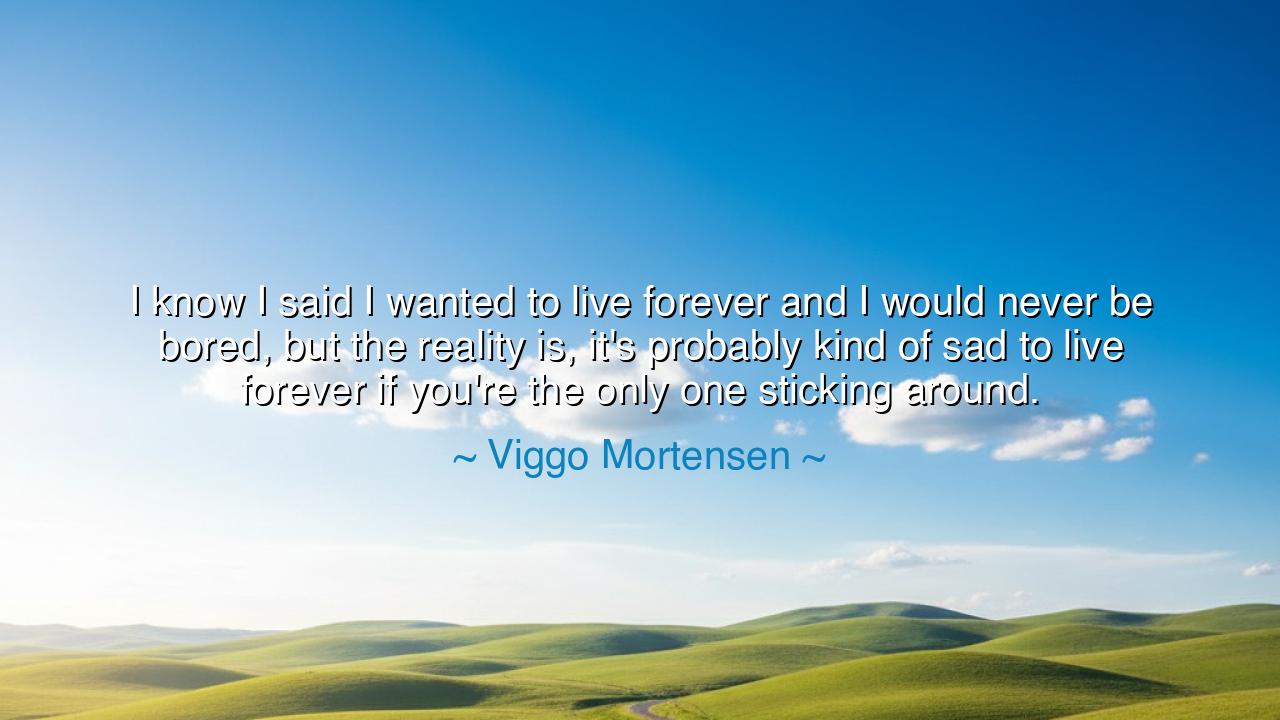
I know I said I wanted to live forever and I would never be
I know I said I wanted to live forever and I would never be bored, but the reality is, it's probably kind of sad to live forever if you're the only one sticking around.






When Viggo Mortensen said, “I know I said I wanted to live forever and I would never be bored, but the reality is, it's probably kind of sad to live forever if you're the only one sticking around,” he touched the deepest chord of the human spirit — the truth that immortality without companionship is emptiness. His words, though spoken in passing, echo the wisdom of the ancients, who knew that eternity without love, without shared memory, without the warmth of others, is not a gift, but a burden. For what gives meaning to existence is not endless time, but connection — the fleeting yet divine act of sharing one’s life with others who, too, are mortal.
The ancients dreamed of eternal life, but they also feared it. In the Epic of Gilgamesh, one of the oldest stories known to man, the mighty king seeks immortality after the death of his dearest friend, Enkidu. Yet when Gilgamesh finally encounters the secret of eternal life, he finds it hollow. He realizes that it is not the length of days that gives them value, but the love and loss that make each moment sacred. Mortensen’s words breathe the same truth: that eternity, stripped of relationship, becomes a lonely silence, where joy fades because no one remains to witness it.
We often say we fear death, but what we truly fear is separation — the loss of those who give meaning to our world. To live forever while others pass is to watch, again and again, the fading of laughter, the crumbling of faces, the vanishing of all that once made life beautiful. The heart that cannot die would eventually tire of loving, for love’s sweetness is born from its fragility. Mortensen’s reflection, tender and human, reveals that the desire for immortality is not really a desire for eternity, but for continuity of love — for the impossible wish that those we cherish might remain with us forever.
Consider the myth of Tithonus, beloved of the dawn goddess Eos. She begged Zeus to grant him immortality, but in her haste, she forgot to ask that he remain young. Tithonus lived on, aging endlessly, until his immortal body became a cage of decay and sorrow. The gods, pitying him, transformed him into a grasshopper — eternally alive, yet condemned to endless, meaningless existence. Mortensen’s insight echoes this tale: to live forever while time devours all you love is to endure the slow erosion of joy, to become a witness to the ruin of everything you once held sacred. Immortality without renewal, without companionship, is a curse disguised as a dream.
And yet, in these words, there is not only sorrow but clarity. Mortensen reminds us that mortality is not our enemy — it is our teacher. Death’s shadow gives light its brilliance. The awareness that our days are limited urges us to cherish them more deeply, to hold those we love closer, to speak kindness before it is too late. If eternity dulls the senses, then transience sharpens them; if endless time numbs the heart, then a single lifetime makes every heartbeat precious. To be mortal is to live fully in the now, to find meaning in the impermanent and beauty in the brief.
There is a modern parallel to this truth in the life of Audrey Hepburn, who in her later years said, “The most important thing is to enjoy your life — to be happy — it’s all that matters.” After fame, after glamour, she turned her energy to helping children in need, as if sensing that fulfillment lies not in lasting forever, but in leaving behind love that endures. Her compassion outlived her; her name became immortal, not through time, but through kindness. This is the immortality that Mortensen’s reflection points toward — not the cold endurance of an endless life, but the warmth of a heart that lives meaningfully while it can.
The lesson, then, is clear: do not chase the illusion of eternal life; instead, build a life worthy of remembrance. Seek not to outlast time, but to fill your time with moments that matter. Love without hesitation. Forgive quickly. Speak truth while your voice still carries. For it is not eternity that makes a soul immortal — it is the depth of its humanity.
So, O seeker of wisdom, hear Mortensen’s quiet revelation: to live forever is not to live truly. Embrace the gift of mortality, for it makes every sunrise sacred, every friendship divine, every farewell meaningful. Live fully now, so that when your time comes, you may not mourn the brevity of life, but rejoice in its brilliance. For to love, to lose, and to remember — that is the only immortality worth desiring.






AAdministratorAdministrator
Welcome, honored guests. Please leave a comment, we will respond soon